Edie Melson's Blog, page 28
January 6, 2025
The Places You’ll Go in Your Writing With Second Person POV

by PeggySue Wells @PeggySueWells
The flavor of Second Person POV is distinctive.
One familiar example is found in the book most often given as a gift to high school and college graduates, Oh, The Places You'll Go!
Popular children's books author Dr. Seuss used Second Person POV in this classic when he wrote
“You have brains in your head.You have feet in your shoes.You can steer yourself any direction you choose.You're on your own.And you know what you know.And YOU are the one who'll decide where to go...”
Second Person POV uses the pronouns You, Yours, and Yourself.
In this POV, the reader is part of the story. The narrator describes the readers' actions, background, feelings, and thoughts.
Cowboys
This perspective is not often used in fiction writing because it is hard to maintain consistently over time. Readers enjoy feeling immersed in a story, but it’s hard for them to suspend their disbelief completely and become a part of the action. For instance, your reader may enjoy hearing about the life of a cowboy, explorer, or hostage, but imagining being in that position for an extended period can be exhaustive.
Similarly, Second Person POV shows up when people speak about themselves without taking personal responsibility.
This sounds like, "You know when you try to go to sleep at night but thinking about the next day's test keeps you awake?"
Or authors who write, "You feel abandoned by God when your prayers are not answered." Such generalities are off-putting for readers who don't feel the way the writer described. The connection the writer hoped to establish with the reader instead resulted in a lack of shared experience.
After all, some folks do not have a sleepless night prior to a test. Some readers may not feel abandoned by God while waiting for answers to prayers. But the reader may feel like the writer does not understand them and is speaking out of turn on their behalf. Those examples may be better written as “Thinking about the next day’s test keeps me awake all night.” Or “When I don’t see an immediate answer to my prayer, I feel abandoned by God. Perhaps you feel the same way.”
For instructional writing, second-person point of view can seem accusatory and suggest that you’re looking down on your reader when combined with phrases like you should, you need to, or you have to.
Yet, Second Person perspective is particularly useful in shorter pieces. Most often, Second Person POV is effective in flash fiction, poetry, short stories, song lyrics, video games, and writing for children.
Marketing
A second-person narrative voice can appeal to a specific type of customer when applied in marketing.
Greeting cards frequently use this point of view with sentiments such as You are four years old today!You did it! Congratulations.Aw, you shouldn't have. But you did!Advertisements commonly use Second Person POV as an inclusive sales tactic. This style creates a personal connection to the product, makes the slogan easy to memorize, and often serves to nurture trust in the product for the consumer.Allstate: "You're in Good Hands" Apple: "Think Different" Burger King: "Have it your way" Budweiser: "For all you do, this Bud's for you" Lay's Potato Chips: "Betcha Can't Eat Just One" L'Oréal Paris: "Because You're Worth It" Nike: "Just Do It"Second Person POV serves as an effective hook for marketing.Looking for a mystery suspense novel to take on vacation?Be sure to check out the resources at SingleMomCircle.com and live life easier and simpler.You have a message or a story you want to share with the world.Roller Coasters and Films
Disney uses Second Person POV in their immersive rides. Park-goers are more than riders on a roller coaster, they are the hero of their own adventures when they step into a Disney attraction such as Big Thunder Mountain RailroadHaunted MansionIndiana JonesIt's a Small WorldJungle CruisePirates of the CaribbeanStar ToursSecond Person POV is used in TV and films when the character breaks the fourth wall and speaks directly to the viewer. Shows that have employed this include The Office Parks and RecreationTrailer for the Star Wars film, The Force AwakensEnola HolmesSecond Person POV serves as a hook to bring readers into an article or story.Have you ever killed anyone?Tired of the same holiday recipes?Ever have one of those days?Speeches commonly include Second Person POV to create an inclusiveness within a cause. You want the best for your children. We all do. That’s why you’re investing in their future.You must be the change you wish to see in the world. People do what they do for their own reasons and it rarely has anything to do with you.While there are exceptions to this as to all other rules, Second Person POV is a unique tool particularly effective when used in smaller projects that contain fewer words than the typical book project.
TWEETABLEThe Places You’ll Go in Your Writing With Second Person POV from @PeggySueWells on @EdieMelson (Click to Tweet)
 PeggySue Wells is the bestselling author of 40 books and collaborator of many more. Action and adventure, romantic suspense, military romance, and cozy mystery are the page-turning novels by P.S. Wells, including Homeless for the Holidays, Chasing Sunrise, The Patent, and Unnatural Cause. How to live better, easier, and simpler is the focus of her nonfiction including The Ten Best Decisions A Single Mom Can Make. Founder of SingleMomCircle.com, PeggySue coaches writing and speaks at events and conferences. When not writing, she parasails, skydives, snorkels, scuba dives, rides horses, and has taken (but not passed) pilot training. Connect with her at www.PeggySueWells.com, on Facebook at PeggySue Wells, and LinkedIn at linkedin.com/in/peggysuewells
PeggySue Wells is the bestselling author of 40 books and collaborator of many more. Action and adventure, romantic suspense, military romance, and cozy mystery are the page-turning novels by P.S. Wells, including Homeless for the Holidays, Chasing Sunrise, The Patent, and Unnatural Cause. How to live better, easier, and simpler is the focus of her nonfiction including The Ten Best Decisions A Single Mom Can Make. Founder of SingleMomCircle.com, PeggySue coaches writing and speaks at events and conferences. When not writing, she parasails, skydives, snorkels, scuba dives, rides horses, and has taken (but not passed) pilot training. Connect with her at www.PeggySueWells.com, on Facebook at PeggySue Wells, and LinkedIn at linkedin.com/in/peggysuewells
Published on January 06, 2025 22:00
January 5, 2025
10 Tips for Writers Hesitant to Embrace Social Media

by Ginny Cruz, MPA, PT
Most writers dream of writing a book and getting a publishing deal, preferably followed by a check with multiple zeros attached. We want the world to love the characters we've developed, the encouragement we share in our devotions or the teachings we compose. I know I do.
None of us, at least no one I've met, wants to market themselves or their writing on social media. While online engagement is second nature for younger writers, for many older ones, it is invasive to our personal lives and feels like work. And to be honest, it is a bit of work, but hear me out.
If you’re standing on the edge, afraid to jump into social media, fearful you’ll make mistakes, jump anyway! You will make mistakes, and that’s okay. No bird has ever flown without leaping from the safety of the nest.
Do you want that book published, or hope your words improve lives? If yes, then embrace the power of engaging with others online. If you’re ready to leap, here are some suggestions.
Even What a Writer is Hesitant Here are 10 Tips to Move Ahead with Social MediaUse social media to find your readers. When you post content regularly on platforms like Facebook, Instagram, or X, you discover the content readers enjoy. This feedback reveals what readers want to read from you. Maybe they prefer when you teach something, or they adore your inspirational stories. Discovering what readers want from you is vital to building an audience for your work.Take advantage of social media's free access. At the end of 2023, Facebook reported a worldwide reach of 3.065 billion monthly users. That’s a billion with a B. It's doubtful that you will ever publish anything (book or magazine) that can reach that number of people. Think about it: your content can encourage, inspire, or teach people behind the Iron Curtain or in countries where your book or article would never be available. Develop your writer's voice by posting regularly. When I finally embraced social media as necessary to build an audience, my persistent question was, "What should I post?" So, I began with what I know. As a pediatric physical therapist specializing in children under age three, my early postings were developmental tips for moms. People loved that information, so I have continued giving readers what they enjoyed. My willingness to build followers with that content led to a book deal and multiple writing opportunities. Learn to meme. A meme (pronounced like seem) is a picture, video, or text shared online. Maybe you've seen those beautiful pictures or videos on social media containing Bible verses or inspirational quotes. Those are memes. Writers create them to encourage their readers. One writer friend of mine has a heart for therapy dogs. Sharing dog videos is always a hit!Start with Facebook. While there are newer platforms (TikTok, for example), Facebook remains the behemoth. If you’re already overwhelmed with where to begin, Facebook is readily available and easy to learn. Set up an account and troll (don't post anything; scroll through and see what others are posting). Doing so helps you understand and discover what you want to share.Use your face for your profile picture. When I started, I preferred being anonymous, so I didn't use my face as my profile picture, instead opting for a sunflower picture. People engage best with people. And people still prefer to see the face of the person to whom they’re communicating. When accounts have other pics or avatars, they could be real or a bot (short for robot). A bot is a robotic computer program designed to post repetitive tasks, like social memes, while appearing human. Putting your picture out there can be scary, but you want people to identify you with your writing.Avoid sharing identifying information. For example, when you post your pictures, do not have your house number, car tag, passwords, or anything you don’t want the world to see in those pictures. Remember that your posts can reach billions. All of those folks are not nice. The more you post, the more you will become aware that some accounts should be blocked. Blocking is necessary, especially for those that appear to be bots. Do not fear doing so. Share your life, not try to sell. Think of your posts as billboards along life’s highway. We’ve all ridden along interstates and know the power of a great billboard. Your memes are like those billboards. What do you want readers to read? Do you want them to enjoy your cooking pictures? Or gain some hope when life gets dark? Social media is about being social and letting readers get to know you. Every once in a while, you can let them know about your products or books. But most of us will scroll past your posts if you constantly sell.Get help from another writer. We’re all on this writing journey together. Some of us are further up the mountain of success than others. Do not be afraid to learn and make mistakes. The older we get, the harder it can be to stumble willingly. Children make tons of mistakes. Be adventurous like a child and make some messes.Just do it. Nike’s famous tagline is brilliant because it's straightforward yet challenging. Most of us have many things we need to do. I need to exercise more. You may need to embrace social media as vital to building a platform for your writing. If so, just do it.
While I can’t say I love putting myself out there online, I no longer dislike it. Over the years, I've learned to enjoy the connections, embrace the opportunities it offers, and appreciate its power to help my readers. Upon deeper reflection, it's truly the chance of a lifetime to reach so many with your work.
If you’re hesitant to try social media, what is one thing you could begin today?
TWEETABLE10 Tips for Writers Hesitant to Embrace Social Media from Ginny Cruz on @EdieMelson (Click to Tweet)
 Ginny Cruz, MPA, PT is a pediatric physical therapist, early intervention specialist, and award-winning author. Her writing encourages and teaches moms simple and effective ways to help their baby meet developmental milestones. In addition to writing, she enjoys hiking, reading, and camping with her husband. Find out more at ginnycruz.com, Instagram, or Facebook.
Ginny Cruz, MPA, PT is a pediatric physical therapist, early intervention specialist, and award-winning author. Her writing encourages and teaches moms simple and effective ways to help their baby meet developmental milestones. In addition to writing, she enjoys hiking, reading, and camping with her husband. Find out more at ginnycruz.com, Instagram, or Facebook.
Published on January 05, 2025 22:00
January 4, 2025
Spiritual Practices for Writers: The Practice of Planning
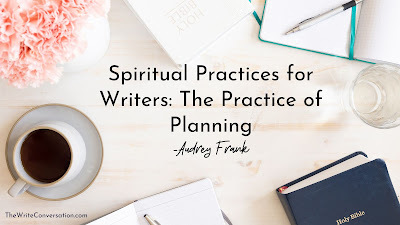
by Audrey Frank @AudreyCFrank
Join me on the first Sunday of each month this year as we examine twelve spiritual practices for writers.
A person plans his course, but the LORD directs his steps (Proverbs 16:9).
If practice truly makes perfect, I should be a perfect planner by now. But after a lifetime of making careful plans, executing them perfectly escapes me.
I planned to have children in year five of marriage, but Child One did not come until year seven. I planned to do all things well so all would go well in my career and family, and many things have not gone so well. I planned an extensive book tour the first year I published and was sidelined by a family tragedy. I planned to submit a two-book series by last May, and I am still writing Book One.
And then there’s exercise.
I digress.
How good it is for writers to know that we can plan our course, but there is One wiser who directs it all! This should be very good news as we ogle a brand new year of possibilities. What plans are in your heart, dear writer? Plan away! Have a planning party, invite all your writer friends, and hand out crisp new agendas with well-inked pens (fine point, black, please.) Raise your glasses in a toast to permission to plan and have at it. Then take a selah and gather those agendas, make an Ebenezer pile, and surrender them to the One who directs our steps.
Throughout the Psalms, selah appears as a sacred pause. Ebenezer references the Hebrew word meaning “stone of help.” The word appears first in 1 Samuel 7:12 after the Lord dramatically delivered the Israelites from the Philistines. Samuel set up a stone and named it Ebenezer, declaring, “Thus far the Lord has helped us.”
When we pause and remember who our Helper is, the new year becomes a journey signposted with peace and joy. Plans planned well include surrender to His sure direction.
The practice of planning is most joyful when we practice surrender.
Lord, I plan my writing course and trust You to direct my steps this year. Amen.
TWEETABLESpiritual Practices for Writers: The Practice of Planning from @AudreyCFrank on @EdieMelson (Click to Tweet)
 Audrey Frank is an author, speaker, and storyteller. The stories she shares are brave and true. They give voice to those whose words are silenced by shame, the hard things in life that don’t make sense, and the losses that leave us wondering if we will survive. Audrey and her family have spent over twenty years living and working among different cultures and world views, and she has found that God’s story of redemption spans every geography and culture. He is the God of Instead, giving honor instead of shame, gladness instead of mourning, hope instead of despair. Although she has three different degrees in communication and intercultural studies, Audrey’s greatest credential is that she is known and loved by the One who made her.
Audrey Frank is an author, speaker, and storyteller. The stories she shares are brave and true. They give voice to those whose words are silenced by shame, the hard things in life that don’t make sense, and the losses that leave us wondering if we will survive. Audrey and her family have spent over twenty years living and working among different cultures and world views, and she has found that God’s story of redemption spans every geography and culture. He is the God of Instead, giving honor instead of shame, gladness instead of mourning, hope instead of despair. Although she has three different degrees in communication and intercultural studies, Audrey’s greatest credential is that she is known and loved by the One who made her.Audrey is the author of Covered Glory: The Face of Honor and Shame in the Muslim World (Harvest House Publishers), an outpouring of Audrey’s heart to introduce others to the God of Instead. Shame is not unique to the developing world, the plight of the women behind veils, young girls trafficked across borders; shame is lurking in hearts everywhere. Through powerful stories from women around the world, Covered Glory illuminates the power of the Gospel to remove shame, giving honor instead. Available at favorite booksellers: BARNES & NOBLE, BOOKS A MILLION, AMAZON.
Published on January 04, 2025 22:00
January 3, 2025
3 Tips for a Writer to Remember When Making Goals

by Tim Suddeth @TimSuddeth
Let me take this time to wish y’all a healthy, happy, and blessed new year. For many of us, this is the time we look back over the previous year and then make plans for the new year. We look for new opportunities and we look for activities that kept us from reaching last year’s goals. Goal making isn’t a one-and-done activity. (Don’t we wish.) It’s a constant recalibration as we continue on this journey called life.
A few years ago, I quit making New Year’s resolutions. I discovered so much during the year that I wanted to change, that waiting until the end of the year made it too overwhelming. Now, I make resolutions on a weakly, uh, weekly basis. Every weekend I plan to start Monday with a quick stretching workout, then spend a few morning hours working on my writing.
Then Monday morning comes. I read the paper, watch the news, catch the scores from the weekend, check X, check Facebook, check my emails, walk the dogs, call customer support for something, do laundry. Oh, and slip in some quantity with my beloved. And before I realize it, the evening is here. So, I push back my goals. Again. Same goals, new Monday.
That doesn’t mean making goals is bad. Goals show us changes we want to make in our lives and to keep us on the right track to reach those goals. But just making a goal won’t produce the desired result. We need to plan a way to reach that goal.
I would like to suggest three tips to remember when making our goals.
Three Tips to Remember a Writing is Making Goals
1. Know the difference between a goal and a process.
It’s January 4th. How many of us have already broken our resolutions? That’s often how I felt. I had grand plans, but when I went to implement them, I didn’t have a clue where to begin.
I’ve started reading Atomic Habits by James Clear this week. It’s been out a few years, but for some reason I’ve recently run across it in several different places. I thought I might need to read it. With my record of setting goals and failing, I’d appreciate any help I can get.
Clear explains the difference between a goal and a process. Most of our New Year's resolutions are goal centered—write a book, start a blog, become a better person. Then New Year's Day comes, and we don’t know where to start. Clear writes, “Goals are about the results you want to achieve. Systems are about the processes that lead to those results.”
We might need to have the same goal as before, but what we need is to come up with a new system to reach it. Your goal may be to wash an elephant. (I mean, let’s be honest, who really wants to eat Dumbo? But keeping your elephant clean, now, that’s important.) Your process has been to buy a hose and a brush with a long handle. Instead, it might be better to get a ticket to the carwash.
By focusing on your process and not the goal, your first step will be smaller and easier to do. And we’ve all seen that after you start with one small victory, you’re encouraged to continue.
2. Know how to use habits to your benefit.
Looking back on my list of activities for a Monday, it’s easy to see I have a lot of habits. Some habits I’ve accumulated, I learned to read the paper in the morning watching Daddy. Some of my habits I’ve just fallen into, like scrolling social media. They aren’t necessarily bad, but they aren’t helping me reach my goals.
I’ll be sixty-four in two months. (I take a size large in gift cards.) One thing I’ve seen is that habits don’t change on their own. They just get more entrenched. My Monday list of to-dos from above shows several old habits, as well as some common distractions. To start a new habit, I may need to get rid of an old one. Move out of my comfy recliner. (As I write this, I’m in my broken-in recliner with my Persian cat purring on my chest.) It’s hard to leave the comforts of the old to face the challenges of the new.
James Clear suggests we don’t have to get rid of some old habits. Instead, we can use them to our benefit. He suggests we add a new habit by habit stacking. This happens when you connect the new desired activity to an old habit. To help with my flexibility (Do any other writers sit too much?), after my quiet time, I’ll lie on the floor and do some stretching exercises. By stacking it onto an activity I already do regularly, it becomes easier to remember.
As for old habits, sometimes to break a bad habit, we only need to look at our environment. If you want to eat healthier, remove the chips, sweets, and candy from the counter and set up a fruit bowl with bananas, grapes, and apples. If you want to write more, leave your laptop out where you will see it. (But not where the cat will lie on it.) Make what you want to do easier. Then stuff the habit you want to quit into the back of the closet.
3. Know that there is something more valuable than your goal.
I think there’s something in everyone’s life that we wish we did better. Becoming frustrated because you aren’t reaching a goal you want, or aren’t being the person you hope to be, doesn’t help anyone. And, as many goals I set and processes I start, there will always be something in my life that I wish I did better. It seems to be part of being a human to not be satisfied.
But we don’t have to give in to never feeling adequate. God says in His word that He has a plan for us (Jer. 29:11, Est 4:14, Rom. 8.28). We can ask Him what He wants us to be and how we should go about that (James 1:5, Phil. 4: 6). I have to admit, this really frustrates me. I want God to shoot down some particular revelation for what I should do. Or send me a manual. But that isn’t how He works. He works through prayer, His word, and His people. He works by guiding us.
Even though our eyes are often focused on the goal, that may not be what’s important. Even more important than reaching your goals is enjoying the journey you’ll be on with Him. Hold tight to His hand. Share your laughs with Him. Look for His fingerprints on your life daily. Then you’ll realize whether you reached the goal that you thought was so important or not, you already have a treasure that is far more valuable.
TWEETABLE 3 Tips for a Writer to Remember When Making Goals from @TimSuddeth on @EdieMelson (Click to Tweet)
 Tim Suddeth is a stay-at-home dad and butler for his wonderful, adult son with autism. He has written numerous blogs posts, short stories, and three novels waiting for publication. He is a frequent attendee at writers conferences, including the Blue Ridge Mountain Christian Writers Conference and a member of Word Weavers and ACFW. He lives near Greenville, SC where he shares a house with a bossy Shorky and three too-curious Persians. You can find him on Facebook and Twitter, as well as at www.timingreenville.com and www.openingamystery.com.
Tim Suddeth is a stay-at-home dad and butler for his wonderful, adult son with autism. He has written numerous blogs posts, short stories, and three novels waiting for publication. He is a frequent attendee at writers conferences, including the Blue Ridge Mountain Christian Writers Conference and a member of Word Weavers and ACFW. He lives near Greenville, SC where he shares a house with a bossy Shorky and three too-curious Persians. You can find him on Facebook and Twitter, as well as at www.timingreenville.com and www.openingamystery.com.
Published on January 03, 2025 22:00
January 2, 2025
How Writers Can Beat Creative Burnout

by A.C. Williams @ACW_Author
Happy New Year! Welcome to 2025! As we roll into a new year and move forward from the disappointments of last year, it’s a good time to take stock of life.
Maybe you’ve already set your goals. Maybe you’ve already made your plans. But if you’re anything like me, by now you’re already beginning to question what you thought you could accomplish.
The holidays are always so much more exhausting than I think they will be, and this year was no exception for a variety of reasons. But I realized something about myself in the beginning of December, maybe even toward the middle of November—something I don’t want to admit out loud: I’m burned out.
I’m burned out in every possible way, physically, mentally, emotionally, but most of all creatively.
Stories have always come naturally to me, and getting words on a page has always been easy. As a younger person, I could easily write more than 20,000 words in a sitting. Granted, they weren’t very good words. But they were words.
As a professional, a 10K day isn’t a challenge for me. Well, it didn’t used to be. Now? At this stage in my life? If I can get 1,000 words I’m doing good. And some days I can’t even get that. And, what’s worse, those 1,000 words aren’t fiction. They are blog posts like this one or devotions.
And that’s great. I’m not complaining about that, but it’s really hard to maintain a career as a fiction author when I can’t write fiction.
I still have ideas. I still think of things that would make great stories. But something has happened to that muscle that takes words out of my brain and gets them on paper. (There are valid reasons, and I know what they are, but I just don’t like admitting it.)
I’m tired. So tired. And starting the year tired isn’t a good idea. So I’m working on making some intentional space for myself to recover from creative burnout in this season, and I figured I would share my process with you guys in case you find yourself in my same shoes.
And maybe, by the end of 2025, I’ll be back to full capacity again. Maybe we all will. Wouldn’t that be lovely?
Here are the things I’m going to do this year to (hopefully) help restore and refresh my creativity:
4 Things Writers Can Do to Fight Creative Burnout
1. Intentionally limiting my phone time
I started keeping track of how long I spend on my phone every day, and—you guys? It’s horrific. Granted, I do a lot of work on my phone. I answer emails, and I bank. But the amount of time I give to my phone on a daily basis doesn’t return an equitable amount of productivity.
So I am deleting my social media apps off my phone. If I need to connect on social media, I can use my computer. I am also going to be relocating my phone away from my bed and going back to an old school alarm clock. The temptation to doomscroll at midnight is a siren call I struggle to ignore.
This will be a big inconvenience, mainly because I’ve learned to do so much of my communication through phone apps. But I suspect that my focus will be so much better if I’m not grabbing my phone every few minutes to make sure I haven’t missed a comment or a post from a friend. Nothing anybody posts is that important.
2. More focus on reading and journaling
I already journal pretty regularly, but I need to put a greater focus on it. And I am planning to integrate it with my morning quiet time. Something that is essential for Christian creatives to remember is that we are partners with God in our creativity. He gave us our imaginations, so trying to use our imaginations without His help is only going to slow us down.
I want to journal with God, to write with Him, to make this journey one we can take together where I can learn more about myself AND Him at the same time. And the same is true with reading. Whether I’m reading the Bible or reading a non-fiction book or a fiction book, I want to keep my mind and spirit attuned to what is true.
Truth refreshes and restores us. God’s Spirit can use it to invigorate our imaginations.
3. Start and finish a small project.
Nothing builds confidence like finishing a project. So start something that you can finish. Maybe it’s building a bookcase. Maybe it’s baking a cake. Maybe it’s cleaning a room in your house. Whatever it is, do something that you can see immediate results from. That will do more for your mental health than just about anything else.
I have several small home projects that I’m going to be working on throughout the year, and I intend to only start them if I can finish them in a few hours.
4. Touch grass
I’m not big into a lot of the Gen-Z idioms, but “touching grass” is one I can get behind. It’s so easy to bury ourselves in our word processors and forget about the outside world, especially if we are on deadline. But that’s a recipe for burnout. We need to be engaged outdoors. We need to get out in nature and breathe and marvel at the trees and watch the sun rise or set.
Get away from your screens. Sit in the grass or walk down the street or listen to the birds sing. Unplug and listen to the silence. Don’t be afraid of it. Don’t run away from the silence because it makes you think things or feel things. That’s what it’s supposed to do.
I’m going to be spending more intentional time outside. Maybe it’s going to be going on walks. Maybe it’s going to be sitting out in the yard and watching the sun rise (once it’s warmer lol). Whatever form it takes, I need to spend more time in God’s Creation, because it reminds me that if He is still taking care of the Earth, He hasn’t stopped taking care of me.
How are some ways you want to try to manage your creative burnout in 2025? Share the goals you are setting for yourself, and maybe we can all help each other.
TWEETABLEHow Writers Can Beat Creative Burnout from A.C. Williams (@ACW_Author) on @EdieMelson (Click to Tweet)
 A.C. Williams, also known as Amy C. Williams, is a coffee-drinking, sushi-eating, story-telling nerd who loves cats, country living, and all things Japanese. Author of more than 20 books, she keeps her fiction readers laughing with wildly imaginative adventures about samurai superheroes, clumsy church secretaries, and goofy malfunctioning androids; her non-fiction readers just laugh at her and the hysterical life experiences she’s survived. If that’s your cup of tea (or coffee), join the fun at www.amycwilliams.com.
A.C. Williams, also known as Amy C. Williams, is a coffee-drinking, sushi-eating, story-telling nerd who loves cats, country living, and all things Japanese. Author of more than 20 books, she keeps her fiction readers laughing with wildly imaginative adventures about samurai superheroes, clumsy church secretaries, and goofy malfunctioning androids; her non-fiction readers just laugh at her and the hysterical life experiences she’s survived. If that’s your cup of tea (or coffee), join the fun at www.amycwilliams.com.
Published on January 02, 2025 22:00
January 1, 2025
A Happy New Year Task for Writers
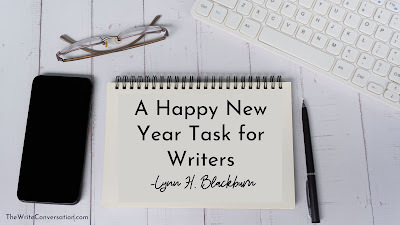
by Lynn H. Blackburn @LynnHBlackburn
Today, I have a brief challenge for you.
If you haven’t already done this, would you consider taking a few minutes to consecrate your 2025 writing life to God?
According to the dictionary, consecrate means “to make or declare sacred.” Another word we might use in place of consecrate is dedicate, which means “to set apart for a definite use.”
So why would we do this?
There are numerous examples in the Old Testament of God instructing his people to take the time to consecrate themselves before a big undertaking—before they entered the promised land, etc. There are also many instances of them being commanded by their kings or military leaders to consecrate themselves to the Lord before a battle.
In the New Testament, Paul tells the Romans to “present your bodies a living sacrifice, holy, acceptable unto God.”
And Peter tells us, “you are a chosen race, a royal priesthood, a holy nation, a people for his own possession, that you may proclaim the excellencies of him who called you out of darkness into his marvelous light.”
As we enter 2025, does it not feel to you that we are on the cusp of a big undertaking? A battle for souls? Do you feel the call to “proclaim the excellencies of him who called you out of darkness and into his marvelous light?”
I do. I feel it all around me.
So, what would this look like? I’ll give you a few suggestions, but ultimately, this is between you and God. What do you sense him calling you to do?
As a starting place, it looks like intentionally praying over the coming year—the projects, proposals, contest entries, storylines, readers, conferences, social media presence, etc. Give everything to God and ask for His wisdom and direction.
You could take this further and pray over your office, your writing space, your computer, even your phone!
And don’t forget about your body. The hands, the eyes, the brain, the legs, and the hips. Because you’ll be sitting for hours as you seek to serve God this way.
I would suggest that you allow God to lead you as you consecrate everything to Him. He’ll probably surprise you with what He considers part of your writing life!
One more thing: Whether you’re reading this on January 2 or December 10, it’s never too late to take this step.
But the New Year feels like a good time to consecrate—to dedicate—every aspect of our writing life to God. To intentionally put ourselves under His authority. To acknowledge his sovereignty. To ask for his guidance. And, ultimately, to declare our trust in Him.
As we enter 2025, my prayer for all of us is that we will put God on display through our words and that He will be glorified!
Grace and peace,Lynn
TWEETABLEA Happy New Year Task for Writers from @LynnHBlackburn on @EdieMelson (Click to Tweet)
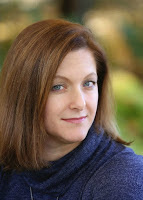 Lynn H. Blackburn is the award-winning author of Unknown Threat, Malicious Intent, and Under Fire, as well as the Dive Team Investigations series. She loves writing swoon-worthy southern suspense because her childhood fantasy was to become a spy, but her grown-up reality is that she's a huge chicken and would have been caught on her first mission. She prefers to live vicariously through her characters by putting them into terrifying situations while she's sitting at home in her pajamas! She lives in Simpsonville, South Carolina, with her true love, Brian, and their three children. Learn more at www.lynnhblackburn.com.
Lynn H. Blackburn is the award-winning author of Unknown Threat, Malicious Intent, and Under Fire, as well as the Dive Team Investigations series. She loves writing swoon-worthy southern suspense because her childhood fantasy was to become a spy, but her grown-up reality is that she's a huge chicken and would have been caught on her first mission. She prefers to live vicariously through her characters by putting them into terrifying situations while she's sitting at home in her pajamas! She lives in Simpsonville, South Carolina, with her true love, Brian, and their three children. Learn more at www.lynnhblackburn.com.
Published on January 01, 2025 22:00
December 31, 2024
Start the New Year Off Right with These Best Tips for Writers

by Edie Melson @EdieMelson
I love beginning something new, and the New Year falls right in with that excitement. I feel like I have the chance to do better, be better, and experience more.
But I’ve also learned that to do those things, I need a little prep work. And me—being me—that involves making a list.
So today I’m sharing the things I’m going to try to do to make 2025 my best writing year yet!
10 Things to Make This Writing Year Better1. Pray More. I’m going to spend more time praying for my writing, for my readers, for me, and especially for other writers. 2. Respect My Call to Write. For me, this means setting aside regular time to write. Not read about writing, attending meetings or conferences, teach other writers, but to actually write!3. Block Out My Creative Time. I’ve discovered the time of day when I’m most creative is in the early morning—before lunch. So I’ll be less accessible then for meetings, email, etc. Instead I’ll be spending my time creating. 4. Deny the Lies the Voices in My Head Tell Me. I am truly my own worst enemy. My mind can come up with more reasons why I shouldn’t, couldn’t, and won’t than anyone else. I’ve learned to combat these lies with God’s truth and I’ll be more consistent about doing just that. 5. Engage in Accountability with Other Writers. No one can do this writing thing in a vacuum. We need each other. I’ll be leaning into my community of fellow writers to hold me accountable to do the things in this list. 6. Let God Set My Priorities. I’m tired of choosing good, when God wants only the best for me. This means learning to say no. And that’s not an easy thing for this people-pleasing gal!7. Allow God to Fill My Creative Well. As I’ve often said, it’s not possible to pour water out of an empty bucket. When I let my creative well run dry it’s because I’m not spending enough time with God. 8. Learn Something New. The world is changing at lightning speed and it’s my responsibility to make staying current a priority. The biggest thing I need to learn this year will be how to incorporate AI ethically and efficiently. (So expect some blog posts about that in the year to come.)9. Write for Fun. All work and no play isn’t good for anyone. So I try to make time to “play” with words. That could mean writing poetry, try a new genre, write for a new outlet—the options are endless. 10. Encourage Other Writers. We should never become too knowledgeable or too busy to give a hand out to those who are coming after us. I try to stay as active in my local writing groups as possible. This makes sure I’m training my replacements, and what the world would see as my competition. In truth, God’s kingdom doesn’t have any competition. There is plenty of work to go around!I hope these 10 things encourage you to make your own list. And I’d love to know what you’d add to this list. Be sure to leave your thoughts in the comments section below.
Don’t Forget to Join the Conversation!BlessingsEdie
TWEETABLEStart the New Year Off Right with These Best Tips for Writers from @EdieMelson (Click to Tweet)
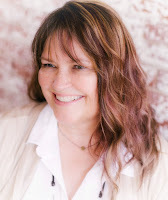 Edie Melson is a woman of faith with ink-stained fingers observing life through the lens of her camera. No matter whether she’s talking to writers, entrepreneurs, or readers, her first advice is always “Find your voice, live your story.” As an author, blogger, and speaker she’s encouraged and challenged audiences across the country and around the world. Her numerous books reflect her passion to help others develop the strength of their God-given gifts and apply them to their lives. Connect with her on her website, through Facebook, Twitter and Instagram.
Edie Melson is a woman of faith with ink-stained fingers observing life through the lens of her camera. No matter whether she’s talking to writers, entrepreneurs, or readers, her first advice is always “Find your voice, live your story.” As an author, blogger, and speaker she’s encouraged and challenged audiences across the country and around the world. Her numerous books reflect her passion to help others develop the strength of their God-given gifts and apply them to their lives. Connect with her on her website, through Facebook, Twitter and Instagram.
Published on December 31, 2024 22:00
December 30, 2024
Bible Verses to Pray for Yourself as a Writer

by Edie Melson @EdieMelson
If you've read this blog for any length of time you know I believe prayer is important. And I advocate praying before we write, as we write, and after we send our words out into the world.
However, I've never shared how critical it is to pray for myself—the writer.
As a believer who writes I feel the weight of being an ambassador for my Jesus. And I feel the weight of knowing I'm not worthy to represent Him—by myself. But God never sends us out into the world, alone, to accomplish what He has planned for us. NEVER. Instead, He comes with us, giving us the strength and the guidance we so desperately need.
And that's why I've found it so important to pray for myself. So these are some of the verses I pray for me, to make sure I'm walking closely with Him, as I write with Jesus.
Bible Verses for Writers to Pray Over Themselves
1. I pray I remember my calling and Who called me: For we are his workmanship, created in Christ Jesus for good works, which God prepared beforehand, that we should walk in them. Ephesians 2:10For it is God who is working in you, enabling you both to desire and to work out His good purpose. Philippians 2:13For I am confident of this very thing, that He who began a good work among you will complete it by the day of Christ Jesus. Philippians 1:6
2. I pray I remember what that calling is: Write therefore the things that you have seen, those that are and those that are to take place after this. Revelation 1:19Then the Lord answered me and said, “Write down the vision And inscribe it clearly on tablets, So that one who reads it may run. Habakkuk 2:2“Thus says the Lord, the God of Israel: Write in a book all the words that I have spoken to you. Jeremiah 30:2
3. I pray I do the work with joy: May the God of hope fill you with all joy and peace in believing, so that by the power of the Holy Spirit you may abound in hope. Romans 15:13Count it all joy, my brothers, when you meet trials of various kinds, James 1:2Those who sow in tears shall reap with shouts of joy! Psalm 126:5
4. I pray for courage: Have I not commanded you? Be strong and courageous. Do not be afraid; do not be discouraged, for the Lord your God will be with you wherever you go.” Joshua 1:9But he said to me, “My grace is sufficient for you, for my power is made perfect in weakness.” Therefore I will boast all the more gladly of my weaknesses, so that the power of Christ may rest upon me. 2 Corinthians 12:9Wait for the Lord; Be strong and let your heart take courage; Yes, wait for the Lord. Psalm 27:14
5. I pray I won't give in to discouragement: Yet those who wait for the Lord Will gain new strength; They will mount up with wings like eagles, They will run and not get tired, They will walk and not become weary. Isaiah 40:31The Lord will also be a stronghold for the oppressed, A stronghold in times of trouble; And those who know Your name will put their trust in You, For You, Lord, have not abandoned those who seek You. Psalm 9:9-10And we know that in all things God works for the good of those who love him, who have been called according to his purpose. Romans 8:28
6. That I always rely on God and don't try to write in my own abilities: Seek the Lord and his strength; seek his presence continually! 1 Chronicles 16:11I can do all this through him who gives me strength. Philippians 4:13A man’s heart plans his way, but the Lord determines his steps. Proverbs 16:9
7. That I am content to wait on God's timing and trust Him with my words: Commit your works to the Lord, And your plans will be established. Proverbs 16:3And let us not grow weary of doing good, for in due season we will reap, if we do not give up. Galatians 6:9But if we hope for what we do not yet have, we wait for it patiently. Romans 8:25
Now it's your turn. What verse(s) do you pray for yourself as you write? Share your thoughts in the comment section below.
Don't forget to join the conversation!
Blessings,Edie
TWEETABLEBible Verses to Pray for Yourself as a Writer from @EdieMelson (Click to Tweet)
 Edie Melson is a woman of faith with ink-stained fingers observing life through the lens of her camera. No matter whether she’s talking to writers, entrepreneurs, or readers, her first advice is always “Find your voice, live your story.” As an author, blogger, and speaker she’s encouraged and challenged audiences across the country and around the world. Her numerous books reflect her passion to help others develop the strength of their God-given gifts and apply them to their lives. Connect with her on her website, through Facebook, Twitter and Instagram.
Edie Melson is a woman of faith with ink-stained fingers observing life through the lens of her camera. No matter whether she’s talking to writers, entrepreneurs, or readers, her first advice is always “Find your voice, live your story.” As an author, blogger, and speaker she’s encouraged and challenged audiences across the country and around the world. Her numerous books reflect her passion to help others develop the strength of their God-given gifts and apply them to their lives. Connect with her on her website, through Facebook, Twitter and Instagram.
Published on December 30, 2024 22:00
December 29, 2024
Avoid the Mistake of Over Writing by Remembering These Things
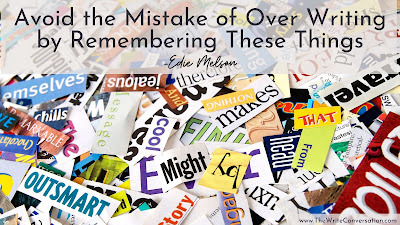
by Edie Melson @EdieMelson
It's important for writers to constantly be honing our skills with words. So sometimes it's important to return to the basics. That's what today's post is about—the danger in over writing.
What is Over Writing?The term means exactly what it says—using too many words to get to the point. And it's a temptation a lot of writers fall into.
If we look at writing from a numbers point of view, it would be logical to assume that the more words, the better. But writing is NOT a numbers sport, and over writing is the mark of a lazy writer.
It's also something we all do, especially in a first draft. There's nothing wrong with that—as long as we take the time to go back and rework what we've written.
Myth:The more words the better. Some of the great writers of all time come to mind to support this myth—can anyone say Charles Dickens? But one thing people forget about this great author is he made his living writing serials for a newspaper. Keeping the story going, kept the paycheck coming. Don’t get me wrong, I think Charles Dickens was a genius writer. But his era was very different from ours. Wise writers take that into consideration before using him as an example to be long-winded.
Fact:It takes more work and more skill to use fewer words to convey the same meaning.
Just in case you’re not convinced, here’s a real-life example. It’s from an article I sold to a home improvement website.
Avoid Over Writing Articles
Long-winded version: An epoxy floor covering for the garage can be a really good thing. It can increase the value of your home and make keeping the garage clean and organized easy. But there are downsides to this option.
We have all gotten the advice that doing something right the first time is the best way. This saying is definitely true when it comes to applying an epoxy floor covering to the garage. When the epoxy floor covering is applied by a qualified professional it can last a lifetime. But if you don’t find a quality product, and a qualified installer the outcome of this project can end up costing you cash instead of saving you. This article will give you everything you need to make the best decision when it comes to adding an epoxy finish to your garage. (138 words)
Tightened version: We’ve all heard the axiom, “Do it right the first time.” This was never more true than when it’s applied to epoxy flooring for the garage. This floor covering can last a lifetime, when applied by a qualified professional. Or it can last less than a year, if you chose the wrong product and installer. We’ll give you all the information you need to make an informed decision. (68 words)
Because of space constraints, the word count was absolute. I had to deliver an informative article in 420 words or less. That meant I had to cut everything that wasn’t absolutely necessary.
What had to go (and why): In the long-winded version of the article, I have a nice lead-in paragraph. It’s not bad, but it’s also not necessary. The tight version manages to give the same information in just under half the word count.
In the long-winded version of the article, there are also lots of repeated words. Not only is this sloppy writing, but it’s also irritating to read.
Tightening up an article is one thing, but what about fiction?
Avoid Over Writing Fiction
The same principles hold true. It's never a good idea to slow down a good story with unneeded verbiage. Here’s an example from a scene I wrote for a cozy mystery:
Long-winded version: She got out of bed and paced around the room, taking deep breaths and willing her heart rate to slow. She’d read somewhere it helped with panic attacks, but it certainly wasn’t doing her any good. Glancing down at the phone still in her hand, her finger shook as it scrolled through previous calls. Her pacing slowed to a stop in the middle of the room. This couldn’t be right. None of the numbers were familiar. (76 words)
Tightened version: She got out of bed and paced the room, taking deep breaths and willing her heart rate to slow. She’d read somewhere it helped with panic attacks, but it certainly wasn’t doing her any good. Her finger shook as it scrolled though previous calls. Her pacing stopped. This couldn’t be right. None of the numbers were familiar. (57 words)
What had to go (and why): In the long-winded version there are several phrases that could be cut because her actions implied them.
Pacing implies around the room. No one can pace in one place.
Her Finger shook as it scrolled through previous calls implies she was glancing down at the phone still in her hand. She's got to be looking at the phone to do this.
In the long-winded version, I slowed down the action in a tense scene with the phrase, her pacing slowed to a stop in the middle of the room. It's much stronger to just say, her pacing stopped.
As you can see, no matter what you're writing brevity is pure gold. Take time to go back over your words, evaluate the effectiveness of each one and keep only the ones you need.
How about you? Are there any redundant phrases you see in books or articles that irritate you?
Don't forget to join the conversation!Blessings,Edie
TWEETABLEAvoid the Mistake of Over Writing by Remembering These Things from @EdieMelson (Click to Tweet)
 Edie Melson is a woman of faith with ink-stained fingers observing life through the lens of her camera. No matter whether she’s talking to writers, entrepreneurs, or readers, her first advice is always “Find your voice, live your story.” As an author, blogger, and speaker she’s encouraged and challenged audiences across the country and around the world. Her numerous books reflect her passion to help others develop the strength of their God-given gifts and apply them to their lives. Connect with her on her website, through Facebook, Twitter and Instagram.
Edie Melson is a woman of faith with ink-stained fingers observing life through the lens of her camera. No matter whether she’s talking to writers, entrepreneurs, or readers, her first advice is always “Find your voice, live your story.” As an author, blogger, and speaker she’s encouraged and challenged audiences across the country and around the world. Her numerous books reflect her passion to help others develop the strength of their God-given gifts and apply them to their lives. Connect with her on her website, through Facebook, Twitter and Instagram.
Published on December 29, 2024 22:00
December 28, 2024
Simplify Your Writing Life This New Year with These 10 Tips

by Edie Melson @EdieMelson
So often we make things harder than they have to be. Sometimes we do it because we’re used to doing things a certain way, or because it’s the only way we know how. But things change quickly these days, and it’s always a good thing to take a look at your routine with a fresh eye.
Today I’m going to share some tips to streamline your writing life. Some you may already do, some you may not have ever considered. Just take a look at the list with an open mind and see if there’s anything on it that can make your life easier.
10 Ways to Simplify Your Writing Life This Year1. Take a look at your goals. It’s important to have goals—and it’s important to have written goals. It’s easy to just float along, taking things as they come. But when we do that, it’s hard to make progress—and it’s even harder to evaluate progress. Beyond that, there’s something almost magical about writing down your goals. Having them recorded somewhere gives them weight and makes it easier to make them a priority.
2. Evaluate how much time you’re spending on social media. If it’s more than thirty minutes a day, it’s time to re-evaluate. After thirty minutes, your return on investment takes a severe nosedive in the downward direction.
3. Let go of your expectations. No this isn’t a contradiction of #1 above. There is a huge difference between goals and expectations. I bet if you’re honest with yourself you have quite a few expectations—from what you expect from yourself, to what you expect from others. For me, when I took a hard look, a lot of those expectations were totally unreasonable. So spend some time and take a hard look at your expectations. The ones that are reasonable, make into goals and priorities. The rest of them . . . well . . . just throw them away.
4. Determine when, in a 24-hour period, you are most creative. Some of us are night people, some are morning people, and some of us work best in the afternoon. But we each have a specific time when the words and ideas tend to flow easier. Look at your internal clock and figure out when that time is. Then, guard it like you’re guarding gold. Really that’s what you’re doing. Our income and dreams are locked up tight with our ability to create. When we figure out the time that work best for creative work, it’s like someone has handed us pure gold.
5. Come up with a way to schedule your time. I know not everyone can have a detailed schedule. But truthfully, if you’re trying to carve out time to write (and who isn’t?), you need to schedule that time. There are lots of methods to help with time management. Do some research and find something that works for you.
6. Commit to quit talking negative to and about yourself. When someone bashes our ability and/or our manuscript, it takes time to recover. The same holds true when we do it to ourselves.
7. Take care of yourself physically. This means getting enough sleep, eating well, and especially exercising. The sedentary lifestyle of a writer can quickly take its toll on us physically and mentally. Sure these things take time—often time we don’t feel we can spare. But even though this may seem counterintuitive, it will streamline your writing life. You can accomplish so much more when you are physically healthy and mentally alert.
8. Build in regular breaks. Especially when I’m on a deadline, I’ve found that taking regular breaks greatly improves my productivity. A good friend and spiritual mentor of mine Kent Pate has a saying, “Divert daily, withdraw weekly, abandon annually.”
9. Surround yourself with encouraging writers. You don’t just need encouraging friends, but also encouraging writers. We writers are an odd lot, and we need others around us who understand our thought process, our struggles and our quirky joys. These writers should be active and growing—not those who just talk about writing, but those who spend time writing.
10. Engage a prayer team. This may seem odd, especially if you’re fairly new to even calling yourself a writer, much less having something published. But the truth is, this life is hard. When we answer God’s call to step out and share His message, we’re going to encounter spiritual warfare. For that, you need people to pray for you. If you’re also building a ministry, trying to grow an income and/or beginning to speak, that’s even more of a reason to surround yourself with prayer. These folks don’t have to be writers, but they should have a connection to you.
These are just some of the things that do to help my writing life stay manageable. I’m sure there are lots of other things that would help as well. Be sure to chime in with your suggestions in the comments section below.
Don’t forget to join the conversation!Blessings,Edie
TWEETABLESimplify Your Writing Life This New Year with These 10 Tips from @EdieMelson (Click to Tweet)
 Edie Melson is a woman of faith with ink-stained fingers observing life through the lens of her camera. No matter whether she’s talking to writers, entrepreneurs, or readers, her first advice is always “Find your voice, live your story.” As an author, blogger, and speaker she’s encouraged and challenged audiences across the country and around the world. Her numerous books reflect her passion to help others develop the strength of their God-given gifts and apply them to their lives. Connect with her on her website, through Facebook, Twitter and Instagram.
Edie Melson is a woman of faith with ink-stained fingers observing life through the lens of her camera. No matter whether she’s talking to writers, entrepreneurs, or readers, her first advice is always “Find your voice, live your story.” As an author, blogger, and speaker she’s encouraged and challenged audiences across the country and around the world. Her numerous books reflect her passion to help others develop the strength of their God-given gifts and apply them to their lives. Connect with her on her website, through Facebook, Twitter and Instagram.
Published on December 28, 2024 22:00



